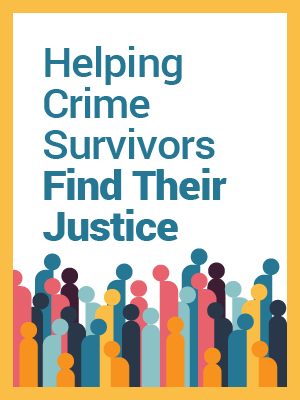Archival Notice
This is an archive page that is no longer being updated. It may contain outdated information and links may no longer function as originally intended.
Message From the Director
The Office for Victims of Crime (OVC) was established as part of the Department of Justice’s Office of Justice Programs in 1988 through an amendment to the Victims of Crime Act of 1984 (VOCA). VOCA and OVC institutionalized a decades-long movement to articulate and enforce the rights of crime victims in the justice system and to offer comprehensive services to victims to support their healing process. Today, OVC provides not only funding, but also leadership, vision, and capacity building to the field of victim services.
Over the past 2 years, we have made a concerted effort to make sure that all victims have the opportunity to heal and to become resilient. We know that every experience is unique, and that one approach does not fit all. We increased outreach to survivors of crime who have been historically underserved, marginalized, and adversely affected by inequality. OVC has instituted several programs to reduce barriers to victim assistance by providing access to services in nontraditional settings, options for survivors to choose what would help them heal, and information about a crime victim’s rights, the criminal justice process, victim services, and their case—all delivered in culturally relevant, victim-centered, and trauma-informed ways.
During my tenure as OVC Director, we’ve funded programs that improve and expand the availability of accessible victim-centered, trauma-informed services for communities facing racial, ethnic, sexual orientation, disability, or age biases, and language or mobility access barriers, and where law enforcement relationships are strained. We’ve enhanced assistance to victims of human trafficking and child abuse, and American Indian and Alaska Native crime victims. And we have taken steps to address generational trauma by funding programs that seek to end the cycles of violence that pervade our most vulnerable communities through hospital-based victim services, telehealth, and youth advocate fellowships.
We’ve also prioritized communicating about and collaborating within the Department and with Congress on the Crime Victims Fund balance, which began to decline at the end of FY 2018. By engaging in numerous informational briefings, adding a regularly updated section on the CVF to our website, and offering live monthly updates of its status, we have created more transparency around the CVF than ever before. We are grateful to Congress for enacting the VOCA Fix Act into law in 2021, and to our partners throughout the Department for their continued efforts to increase deposits into the fund. OVC and the Department remain committed to this transparency and to ensuring solvency of the CVF.
I am grateful to all the brave victims and survivors of crime who have provided us with authentic and valuable feedback, insight, and suggestions for change. Without their voices, our programs would not reflect the reality of what is truly needed to heal and prosper in the aftermath of crime. I want to thank the tremendous OVC staff, grantees, and program partners who continue to fulfill OVC’s mission every day through their selfless and extraordinary efforts. I’m proud of the contributions our funding has made to the communities and crime victims who need it most.
As always, OVC remains committed to helping all victims and survivors find their justice.
Kristina Rose
Director
Office for Victims of Crime




